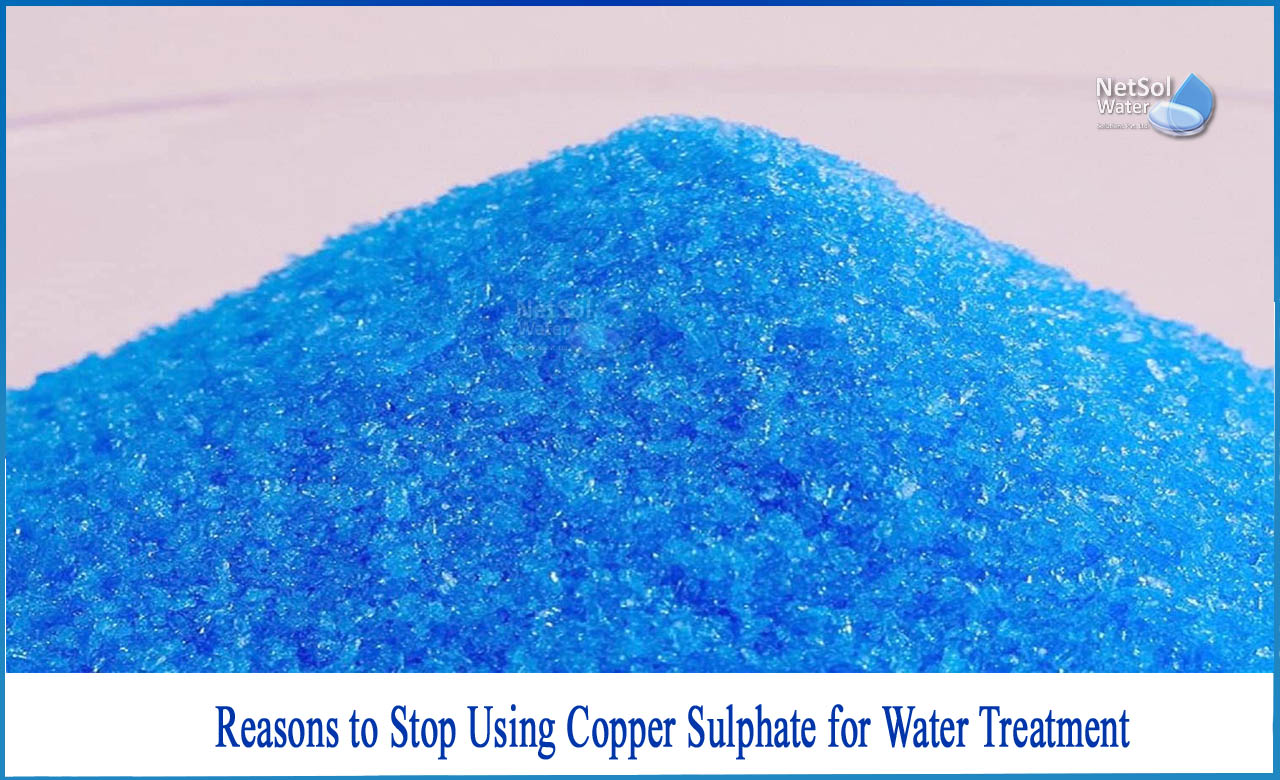What exactly is copper sulphate?
Copper sulphate is an inorganic compound formed by the combination of Sulphur and copper. It has the ability to kill bacteria, algae, roots, plants, snails, and fungi. The toxicity of copper sulphate is determined by its copper content. Copper is a necessary mineral. It is present in the environment, food, and water.
What are the reasons to stop using copper sulphate for WTT?
Copper sulphate binds to proteins found in fungi and algae. This causes the cells to leak and die as a result of the damage. Copper interferes with the normal functioning of skin cells and enzymes in some organisms.
Reasons you should never use regular Copper Sulphate for Water Treatment
1. It does not address the underlying causes of algae in your pond
When applied to an infected body of water, it can only treat the visible symptoms of algae. It only targets the algae itself, rather than the nutrients that cause it to grow in the first place. As a result, copper sulphate becomes ineffective—it kills the algae, which then sinks to the bottom of the pond and decays, releasing additional toxins that can cause more blooms, resulting in an even bigger problem than you started with.
2. It is poisonous to humans
Copper sulphate, when used to combat algae blooms in water, can be hazardous to humans. Because copper sulphate is easily absorbed through the skin, those who administer it must exercise extreme caution to avoid even minor skin contact with it. If you come into contact with it, it can cause itching and a permanent yellow discoloration of your skin.
Furthermore, if ingested (via inhalation of the powder or drinking it), copper sulphate can cause immediate vomiting, as well as unconsciousness, burning pain, nausea, diarrhea, headache, shock, and unconsciousness if retained in the stomach. The risks to human health outweigh the benefits of curing an algae bloom.
3. It is more likely to aid in the recovery of blooms
When applied to water, it quickly sinks, causing it to accumulate as a heavy metal precipitate. This buildup of copper sulphate and decaying algae causes the release of toxins, which can cause the accumulated mass to resurface or "rebound" to levels comparable to, or higher than, the original bloom. It also hastens the recycling of phosphorus, which can promote algal blooms. As a result, using copper sulphate will result in more work in the end.
4. It is not biodegradable
When copper sulphate is applied to water, it forms a heavy metal precipitate, as previously stated. As a result, it does not biodegrade. A copper sulphate build-up can result in a sterile water bottom, which can reduce and kill beneficial bacteria. It is not natural and cannot be removed without the use of additional chemicals or treatments.
5.It is harmful to both plant and aquatic life
The build-up of copper sulphate after application can result in a sterile water bottom that kills off important nutrients and bacteria that fish and other aquatic life requires. Copper sulphate can disrupt the aquatic food chain by killing off weaker fish that rely on nutrients to survive, resulting in overpopulation of some species for brief periods of time (until they die off because they are without a food source). It also produces over-oxygenated water, which can kill plants. Finally, animals that drink from this water may be more likely to be injured or killed.
6. Its accumulation is costly to remove
When copper sulphate accumulates, it may be considered hazardous waste. When disposal is required, the hazardous waste status can increase the cost of disposal due to the need for professional cleanup.
7.It has the potential to make water runoff dangerous
Copper sulphate is known to accumulate after use, making runoff water potentially hazardous to those who come into contact with it. Copper sulfate-contaminated water can be harmful to crops, animals, and humans. As a result, copper sulphate poses an unnecessary risk.
8. It is extremely corrosive
Another disadvantage of copper sulphate is that it is extremely corrosive to steel, iron, and galvanized pipes. It must only come into contact with stainless steel, or plastic and cannot be stored in metal containers. Because of its corrosive nature, copper sulphate is incompatible with cost-effective storage methods, making it more of a nuisance to use than a benefit.
Conclusion
The process of water purification and copper sulphate removal offers numerous advantages, making it a feasible long- and short-term solution to the world's current water issues, which is only getting worse as the world's population grows. Expanding the wastewater treatment sector will result in enormous amounts of fresh water being produced, reducing water scarcity.
What does Netsol Water has to offer?
Netsol Water is a significant water and wastewater treatment firm in India, offering WTP, WWTP, STP, and ETP manufacture, among other services. We have made it our mission to save the planet.
The company creates equipment’s and is committed to providing practical solutions that help businesses flourish. We are committed to providing our valued customers with hands-on service, expert counselling, and training.
Netsol Water is Greater Noida-based leading water & wastewater treatment plant manufacturer. We are industry's most demanding company based on client review and work quality. We are known as best commercial RO plant manufacturers, industrial RO plant manufacturer, sewage treatment plant manufacturer, Water Softener Plant Manufacturers and effluent treatment plant manufacturers. Apart from this 24x7 customer support is our USP. Call on +91-9650608473, or write us at enquiry@netsolwater.com for any support, inquiry or product-purchase related query.



